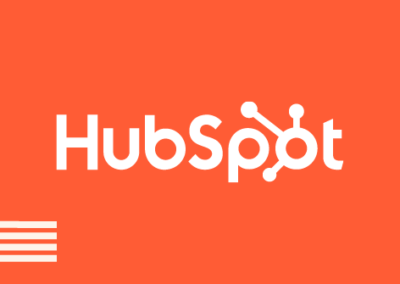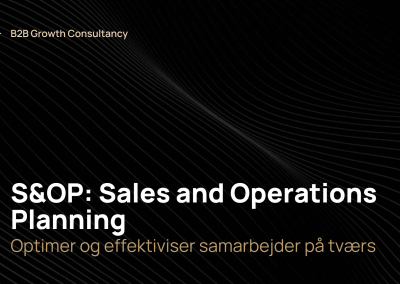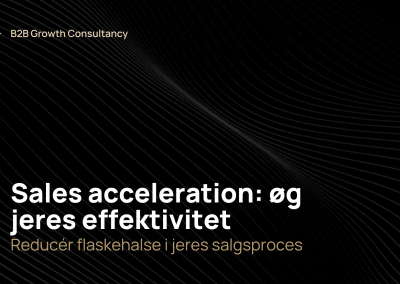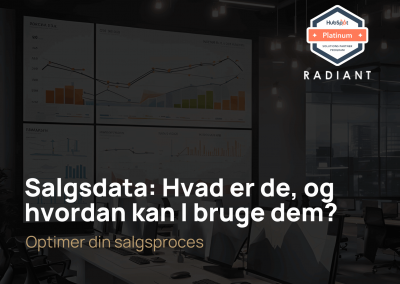As a business owner, CEO or decision-maker in implementing a CRM system, it’s important to understand the differences between CRM and ERP and which system best matches your business needs. In this article, we will explore the definitions of both CRM and ERP, compare the two systems and discuss the benefits of implementing a CRM system specifically aimed at entrepreneurs.
What is CRM?
A CRM (Customer Relationship Management) is a system used to manage a company’s customer relationships and interactions with customers. With a CRM, you can store and analyze customer data to build better relationships with your customers. The system provides a centralized platform for managing sales activities and quick access to relevant information about each customer.
Some of the core functions of a CRM system are:
- Storage of customer data, including contact information, as well as associated deals, companies, past sales notes and inquiries.
- Automation of processes including marketing emails, sales follow-ups, emails, etc.
- Pipeline management and building with automations based on how long the deal is in the pipeline
- A comprehensive overview of all your activities to measure ROI
- Dashboard and reporting on customer data and activities, including number of sales emails sent, phone calls taken and data quality
You can read more about CRM in our post: “What is CRM?“
CRM systems play a crucial role in improving the customer experience and optimizing the sales process. By collecting and organizing important customer data, CRM systems allow you to better understand your customers, personalize communication and deliver tailored solutions. This results in increased customer satisfaction and more efficient sales processes, which can give your business a competitive advantage.
In short, a CRM system creates an omnichannel experience that enables you to target prospects and customers with the same messages throughout your sales process.
What is ERP?
ERP stands for Enterprise Resource Planning and is a software system that integrates different business processes within a company. This includes functions such as financial management, production, inventory management and human resource management. The purpose of ERP is to provide a centralized platform for efficient operation of the entire business.
By automating processes and connecting departments, ERP systems help increase productivity and reduce errors. By aggregating data across the organization, it gives decision-makers a holistic view of business performance, making it easier to make informed decisions. Through optimized workflows, ERP can also contribute to faster response times to customer needs.
The core functions of an ERP system include:
- Financial management, including accounting and budgeting
- Procurement and logistics management
- Production optimization
An ERP system can contribute to your operational efficiency by bringing together and integrating different business processes. This includes functions like inventory management, finance and production, all of which can be optimized through automation and centralization of data.
By implementing an ERP system, companies can gain better control over their processes, reduce the risk of errors and incorrect information, and improve productivity across departments. This leads to more efficient workflows, increased transparency in decision-making and an overall strengthening of the company’s operational foundation.
The difference between CRM and ERP
CRM and ERP are two different systems that can both be beneficial to your business. The CRM system focuses primarily on customer-related work such as sales, customer service and marketing, while the ERP system has broader applications throughout the company, including finance and logistics.
CRM and ERP systems have different focus areas and benefits:
- The CRM system focuses primarily on customer interaction, sales management and marketing activities. It helps increase customer satisfaction, streamline the sales process, reduce churn and drive targeted marketing.
- The ERP system is designed to handle your company’s internal processes such as finance, inventory management and production optimization. It helps improve operational efficiency, minimize costs and ensure better control over company resources.
When choosing between a CRM or ERP solution for your business, it’s important to evaluate your specific needs, as there is a difference between a CRM and ERP system. If your company’s main challenges are related to customer interaction and sales and marketing activities, a CRM system should be prioritized. Conversely, if your challenges lie in the management of internal processes such as finance or production planning, you should opt for an ERP solution.
How do you choose a CRM or ERP system?
Before choosing between a CRM or ERP system, it’s important to understand your specific needs and objectives. This will help identify which system can best meet your requirements.
When considering different solutions, carefully evaluate the specific features and integrations that both CRM and ERP systems offer. This ensures the system’s functionality and your organization’s needs match.
It can be beneficial to seek advice from experts or consultants in the field, such as a HubSpot partner like Radiant. HubSpot partners have experience in implementing both CRM systems and can help guide you towards the most suitable solution for your business. However, companies such as ERP consultants are the ones to turn to for guidance on whether an ERP system is the way to go.
In short, you need to:
- Understand your business needs
- Assess the features of both systems
- Talk to experts
At Radiant, we have implemented 100+ CRM systems for businesses and therefore have the knowledge and experience to help you implement the perfect CRM system. Feel free to reach out to us for non-binding guidance.
Who benefits from a CRM system?
As mentioned earlier, a CRM system is relevant for 90% of all B2B companies. However, it is a particularly valuable tool for entrepreneurs and small to medium-sized businesses. Here’s a short list of the companies that typically choose to implement a CRM system.
- Software companies
- Enterprise SaaS
- Professional service companies
- Companies with long sales cycles
- Companies with great deals
- Companies within tech
- Companies within finance
- Start-ups
- Scale-ups
- Manufacturing companies
Read our case studies of companies that have implemented a HubSpot ‘Radiant’s references‘
CRM for entrepreneurs
Implementing a CRM system can be crucial for entrepreneurs. A CRM system allows for better customer interaction, increased sales efficiency and a more structured sales process. It also helps build and maintain long-term customer relationships, which is crucial to the growth and success of a business.
A CRM system makes it easier to organize and analyze customer data and track sales activities. This leads to better decisions based on data insights, which in turn can optimize the marketing and sales strategies of your business. By implementing a CRM system, entrepreneurs can therefore create greater efficiency, productivity and profitability in their businesses.
Another benefit of implementing a CRM system as an entrepreneur is that a CRM will save you a lot of time as it creates structure, processes and opportunities for automation. A CRM system is therefore considered an important and major step in the right direction for creating an efficient business.
Read also: “The 10 best CRM systems 2023“
CRM for small and medium-sized businesses
A CRM system is essential for small and medium-sized businesses as it helps build and maintain strong customer relationships and secure your data. With a CRM system, you can organize and analyze customer data, allowing for better targeted sales and marketing strategies. In addition, a CRM can also streamline communication within the company, contributing to increased productivity and collaboration.
A streamlined CRM solution gives small and medium-sized businesses a competitive advantage by creating an omnichannel experience that increases relevance and personalizes the experience for customers. By keeping track of customer interactions, past purchase history and preferences, businesses can deliver tailored offers and services that meet individual needs. This results in higher customer satisfaction and loyalty over time.
Furthermore, a good CRM system makes it easier to identify potential leads and follow up on existing sales opportunities, which increases the chances of converting potential customers into actual sales, thus increasing the ROI of your activities.
Get help with your CRM strategy with Radiant
Radiant helps companies implement a 360-degree CRM system tailored to your specific needs. First and foremost, we help you set the framework for a strategy so we know which hubs you need, and then we negotiate the prices for them.
Radiant has implemented 100+ HubSpots over the years, and we often receive inquiries about optimizing and maintaining them. This is because CRM systems are constantly evolving, increasing the demands for maintenance and optimization. That’s why we developed HubSpot as a Service. This is where we step in and become the strategic and executing partner that makes sure your CRM doesn’t stop you from focusing on your core competencies and what you’re good at.
In addition to CRM implementation and optimization, Radiant also helps with sales through Sales as a Service. This is where Radiant steps in to represent you and execute on sales. With experience in the finance, tech, Saas and professional services verticals, Radiant has built a sales team that has generated 70+ ARR on behalf of its customers.
All in all, Radiant helps drive a company’s commercial activities that bring a positive ROI (return on investments).
Meet some of our CRM-experts

Malthe Aarestrup
Malthe has extensive experience in optimizing and setting up CRM systems. His expertise is particularly strong within sales and service, where he has significant hands-on experience and a deep understanding of the complex dynamics within departments. He also knows how these systems should function in practice, not just as theoretical strategies on a whiteboard.

Simone Sørensen
Simone has extensive experience with HubSpot and is the only official female HubSpot trainer in Denmark. With expertise in customizing and utilizing CRM systems to optimize processes across industries, she works passionately with a specialization in CRM expertise. Her experience includes:
- Migration of data between CRM systems
- Funnel optimization for improved customer engagement
- Training employees in the use of CRM systems



